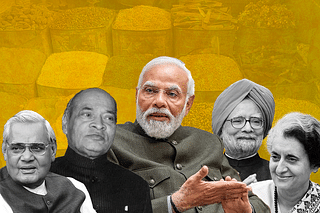Technology
Chorus To Build 'Sovereign AI' Grows Louder Worldwide — India Is Laying The Groundwork
Karan Kamble
Feb 14, 2024, 01:15 PM | Updated Feb 15, 2024, 02:33 PM IST
Save & read from anywhere!
Bookmark stories for easy access on any device or the Swarajya app.

Artificial intelligence (AI) occupies the centre stage in the world today and is here to stay, reshaping it as we head ambitiously into a wildly exciting, but as yet unknown, future.
While private companies utilise the ever-growing computational power to build ever-more powerful AI technologies, the role of the nation-state in this monumental technological leap is anyone’s guess.
But not to Jensen Huang — the founder, president, and chief executive of NVIDIA, a leading manufacturer of high-end graphics processing units or GPUs, which are essential to AI development today.
In a conversation about the future of AI at the World Governments Summit 2024, Huang threw his weight around the idea of “sovereign AI” — a buzzword in the AI space of late.
“Sovereign AI” refers to AI infrastructure — mainly computing infrastructure and large language models — developed and controlled by a specific country or government. It implies that AI is used for the benefit of that country's interests, policies, and goals, which is at best incidental in the case of AI developed by corporations, for whom profits and market share matter significantly more.
“This (AI) is the beginning of a new industrial revolution, and this industrial revolution is about the production, not of energy, not of food, but the production of intelligence. And every country needs to own the production of their intelligence. Which is the reason why there is this idea called sovereign AI,” Huang said at the summit, on 12 February.
“You own your own data, nobody owns it. Your country owns the data, it codifies your culture, your society’s intelligence, your common sense, your history — you own your own data. You, therefore, must take that data, refine that data, and own your national intelligence. You cannot allow that to be done by other people,” the NVIDIA chief said.
This isn’t the first time that Huang has made a strong case for sovereign AI, nor is he the only influential tech-executive to do so.
In August 2023, Arvind Krishna, the chairman and chief executive officer of IBM, said he was a “firm believer that every country ought to have some sovereign capability on artificial intelligence, including large language models for AI.”
“You might want to use it for purposes the rest of the world does not want to invest in, or for purposes that you may not want to expose to the rest of the world,” he said.
Krishna also pitched the idea of a national AI computing centre which could fall “under one of the existing bodies, or under a new body — the same way it did for supercomputing under CDAC.”
Such a centre, he proposed, could help in the creation of datasets which the government could then use in the areas of, say, agriculture and health.
Sovereign AI offers a country a wide range of benefits stretching across national security, economic growth, public services, data protection, and strategic autonomy.
For example, it can drive economic growth by increasing productivity, enabling innovation, and creating new industries and jobs. It can improve the efficiency and effectiveness of public services like healthcare and education. It can help protect a country's sensitive data by reducing reliance on foreign AI systems that may pose data security risks. It can give countries greater control over their AI capabilities, reducing dependence on foreign technology and ensuring that AI is aligned with national interests and values.
On the flipside, concerns might arise about the potential misuse of sovereign AI for surveillance, control, and other harmful purposes. On the already-heated geopolitical front, it could emerge as another potential point of competition, if not contention, tension, and conflict.
Some might even argue that governments would be better off leaving the main business of AI innovation to the private sector, while taking on only those aspects which the industry wouldn’t venture into.
In any case, the idea of sovereign AI seems to be catching on. Countries around the world are beginning to contemplate setting up their own AI infrastructure. Some of the early movers in this space include India, Japan, France, Canada, Singapore, and the Netherlands, while the United States and China probably have both their feet in the AI development door.
For India, building sovereign AI might fit neatly into its broad, consistent, years-long vision of ‘Make-in-India’ and ‘Aatmanirbhar Bharat’ (self-reliant India). Naturally, an ambitious “India AI programme” is in the works.
During a fireside chat organised by Moneycontrol in Bengaluru around mid-December 2023, the Minister of State for Electronics and Information Technology (IT) Rajeev Chandrasekhar spoke about putting together an AI framework.
“We see AI as a significant bolt to the already galloping Indian digital economy, acting as a kinetic enabler. To enable the AI ecosystem, we have put together an overall framework that talks about AI compute capacity,” he said.
On the Centre’s plans, he said: “The Government will deploy financial resources for building foundational models, Large Language Models (LLMs), and various use cases. Similar to the semiconductor model, we will fund startups as well.”
He had said earlier that India was determined to have sovereign AI, in the vein of India’s digital public infrastructure, whose main offerings include the biometric identity programme, Aadhaar and payments solution, Unified Payments Interface.
Speaking last month on the sidelines of the inauguration of a semiconductor-focused software company, Chandrasekhar said the India AI programme would be worth over Rs 10,000 crore and the Ministry of Electronics and IT (Meity) is set to seek Cabinet nod for the ambitious India AI programme.
With an estimated outlay exceeding Rs 10,000 crore, the programme aims to establish GPU-based servers in a public-private partnership (PPP) model. AI-focused working groups have recommended the creation of a three-tier compute infrastructure, which would incorporate 24,500 GPUs.
The AI working groups have proposed the establishment of cutting-edge AI compute infrastructure at five locations with an impressive 3,000 AI Petaflops (PF) of computing power. This capacity is 15 times greater than the highest capacity currently installed. Additionally, the groups suggest setting up an Inference Farm with 2,500 AI PF and Edge Compute systems with 500 AI PF.
Over the past eight years, the government has invested Rs 1,218.14 crore in setting up 24 Petaflops of compute capacity under the National Supercomputing Mission.
India is aiming to establish a total compute capacity ranging from 10,000 GPUs to 30,000 GPUs under the PPP model. Additionally, an extra 1,000 to 2,000 GPUs are planned to be set up through the Centre for Development of Advanced Computing (C-DAC), as told by Chandrasekhar to the Indian Express.
The idea is to enable startups to tap into this computing infrastructure as a public good rather than leave them to buy these highly expensive resources for themselves, which would prove unaffordable to many.
According to Chandrasekhar, the AI compute part will have two segments — one led by the private sector and the other involving indigenous development of public sector capacity for AI emerging from the C-DAC, which will be available to the Indian ecosystem.
Computing capacity is a foundational element of AI, enabling the development and deployment of sophisticated algorithms that can process data, learn from it, and make intelligent decisions.
Huge amounts of quality data will also be necessary for AI to give the best results. Meity unveiled a draft of the National Data Governance Framework Policy in May 2022.
This policy included a proposal to establish an India Datasets platform, which will house non-personal and anonymised datasets from central government entities that have gathered data from Indian citizens or individuals within India.
The platform’s primary purpose, as per the draft proposal, is to make non-personal data accessible to startups and Indian researchers.
India is already making excellent use of AI technologies, for instance, in language translation with its Bhashini programme. Areas like agriculture, education, healthcare, and governance, among others, may accrue benefits in years to come.
Also Read: How India Is Using AI To Build The Internet For Local Languages
Save & read from anywhere!
Bookmark stories for easy access on any device or the Swarajya app.
Karan Kamble writes on science and technology. He occasionally wears the hat of a video anchor for Swarajya's online video programmes.
Introducing ElectionsHQ + 50 Ground Reports Project
The 2024 elections might seem easy to guess, but there are some important questions that shouldn't be missed.
Do freebies still sway voters? Do people prioritise infrastructure when voting? How will Punjab vote?
The answers to these questions provide great insights into where we, as a country, are headed in the years to come.
Swarajya is starting a project with an aim to do 50 solid ground stories and a smart commentary service on WhatsApp, a one-of-a-kind. We'd love your support during this election season.
Click below to contribute.





